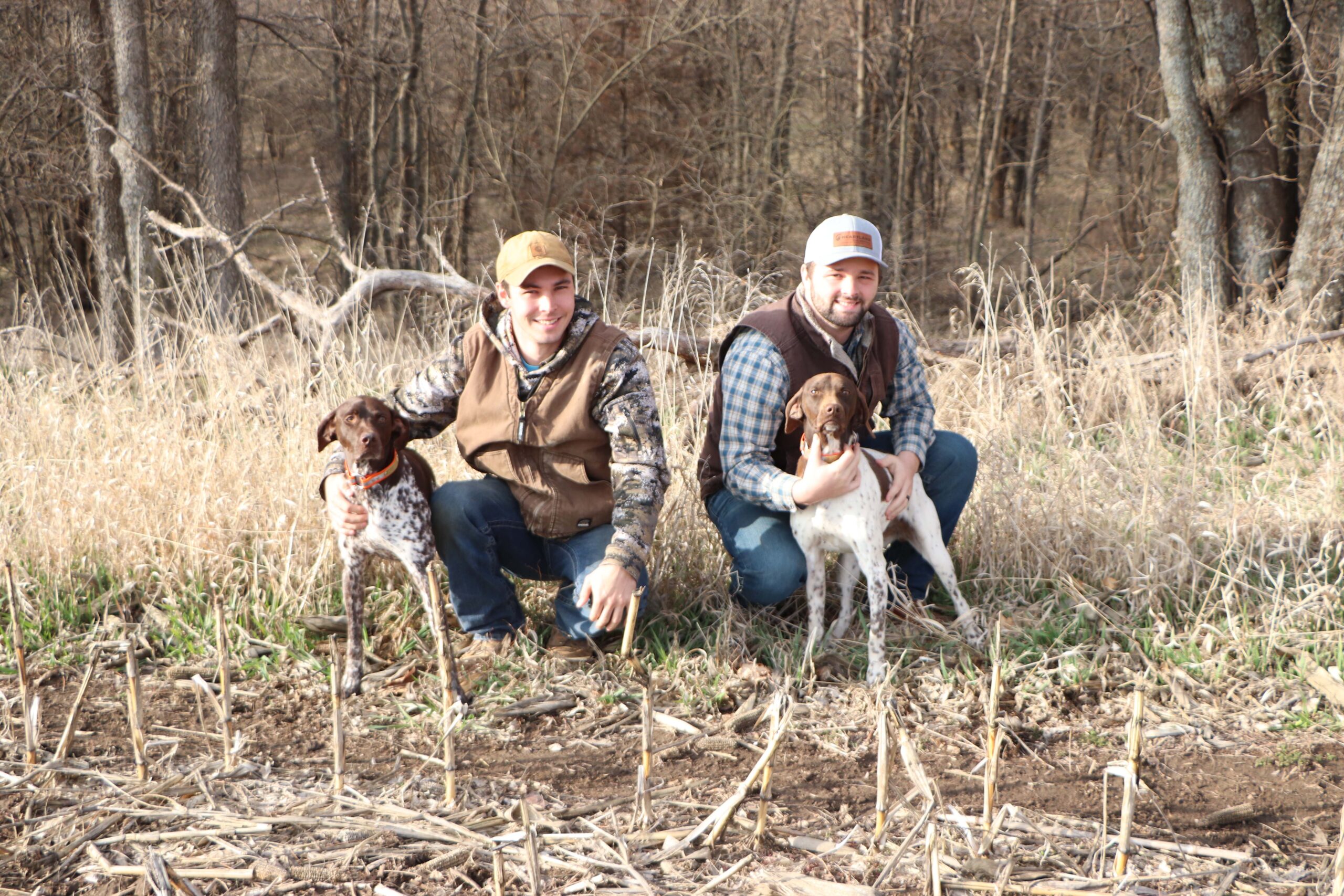Andrew Noll, and his dog, Zetta, along with Casey Willyard and Lilly, make up two of the board members of the newly founded Mooney Creek Pheasants Forever Chapter.
by Bridget Weishaar
Pheasants Forever, the nation’s leading upland wildlife habitat conservation group, now has its very own chapter in Jefferson County, due to a group of young men passionate about upland game birds and their habitat.
At the helm of the newly formed chapter is president Casey Willyard. Willyard is a 2021 graduate of Kansas State University, Manhattan, where he obtained a degree in Agronomy and Ag Tech.
His study of plants and how they benefit society, combines with his love of the great outdoors, wildlife, and agriculture, left him with a feeling of wanting to do more in the area he has grew up in since his college graduation.
Though a member of the K16 Quail Forever Chapter, an entity of Pheasants Forever, Willyard was unable to attend the orginization’s annual banquet because it was sold out months in advance.
He started doing research and discovered not only was there no chapter in the immediate area, there were also no chapters in the surrounding areas of Atchison and Leavenworth counties. Willyard reached out to the eastern Kansas regional field representative Hunter Moore with questions and, in less than a couple days time, had a board established and the new chapter was formed.
Being an avid hunter, the decline of upland game birds, a term which refers to non-water fowl in groundcover-rich terrestiral ecosystems above wetlands) in the area over the past several years, was a concern for Willyard.
One of his main goals in forming the new chapter is to try and improve the seemingly declining quail population. The second is to try and return a stale pheasant population to Northeast Kansas.
Second in command as vice-president of the chapter is Valley Falls native Luke Burns. Burns, like Willyard, has a love and appreciation for the great outdoors.
He has been working in the natural resource field for just over nine years, after graduating from Kansas State University with a degree in fisheries and wildlife management.
He has been employed by the Kansas Department of Wildlife and Parks, Pheasants Forever, the National Resources Conservation Service, and is currently a wildlife biologist for a private company.
Burns will focus on improving habitat in every way possible. His biggest motivation is to get more native grass back on the landscape and to maintain it to a way that is beneficial for all wildlife.
Andrew Noll, rural Winchester, is the chapter’s habitat specialist. He brings to the table a bachelor’s degree in wildlife and outdoor enterprise management from Kansas State University. His knowledge and dedication to the preservation of upland birds makes him an instrumental piece to the chapter.
Noll has been the sole proprietor of Black Bottom Gamebirds just outside of Winchester for the past three years. He currently has just over 2,200 pheasants in inventory. A majority of the pheasants will be sold to private hunting clubs while the others will be released in nature.
Willyard’s older brother, Patrick, carries the title of youth coordinator. Getting youth involved in the outdoors and interested in wildlife will be his main goal. Patrick has led youth outdoor/wildlife events for other organizations. His mission is to organize at least two youth hunting events for the chapter each year.
Brooks Mize, Nortonville, rounds out the group as a community outreach member. Mize is in charge of obtaining sponsorships as well as new memberships. He will be doing a lot of outreach around the community and behind-the-scenes work.
Mize has a love of working with bird dogs and a passion for hunting.
Standing in as interim treasure will be Willyard’s wife, Julie, until another can be found.
Although the Mooney Creek branch is only months old, the group has big plans for its future. Willyard will begin practice on his own land in the future in the form of buffer and filtration strips. Buffer strips are areas of permanent vegetation located within and between agricultural fields and the water courses to which they drain.
Once planted, these areas will allow for increased habitats for pheasants and quail.
Willyard has begun working with the Jefferson County Conservation district in Oskaloosa to obtain information about the Conservation Reserve Program. According to the Pheasants Forever website, the CRP program enables producers to enroll difficult-to-farm acres in the program to improve wildlife habitat, soil health, water quality, and climate resiliency. Once approved, the conservation office will pay for the planting of the buffer strips. The sign-up period for the CRP program runs until April 7.
Along with the planting of natural grasses, Willyard, Noll, and Burns are also raising their own flocks to help with the pheasant population.
Anyone can become a member of Pheasants Forever; there is no age limit or requirements for membership. Different levels of memberships are available, as well as lifetime memberships.
Persons interested in joining the Mooney Creek chapter can reach Willyard at 913-645-3014 or mcpheasantsforever@gmail.com. They also sign up online at www.pheasantsforever.org.
The group can also be found on Facebook at Mooney Creek Pheasants Forever. The next chapter meeting is scheduled for March 29 at the Valley Falls home of Luke Burns.


